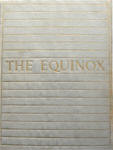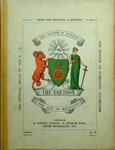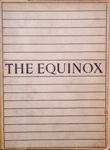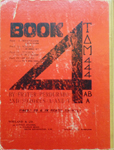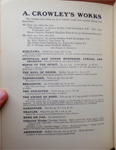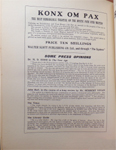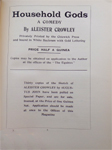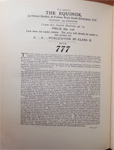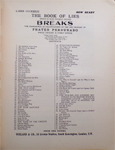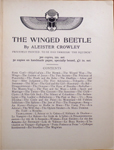100th
MP

|
THE
100th
MONKEY
PRESS |
|
|
|
Limited Editions by Aleister Crowley & Victor B. Neuburg |
|
Bibliographies |
|
Download Texts
»
Aleister
Crowley
WANTED !!NEW!!
|
|
THE EQUINOX VOLUME I, NUMBER X |
|
Image Thumbnails |
||||||||||||||||||||||||||||||||||||||||||||||||||||||||||||||||||||
|
Title: |
The Equinox (Volume I, Number X). The Official Organ of the A\A\ |
|
||||||||||||||||||||||||||||||||||||||||||||||||||||||||||||||||||
|
Variations: |
|
|||||||||||||||||||||||||||||||||||||||||||||||||||||||||||||||||||
|
Publisher: |
Wieland and Co.1 33 Avenue Studios, South Kensington, London, S.W.2 |
|||||||||||||||||||||||||||||||||||||||||||||||||||||||||||||||||||
|
Printer: |
Richard Clay & Sons, Limited, Brunswick Street, Stamford Street, W.D., and Bungay, Suffolk.2 |
|||||||||||||||||||||||||||||||||||||||||||||||||||||||||||||||||||
|
Published At: |
London.1 |
|||||||||||||||||||||||||||||||||||||||||||||||||||||||||||||||||||
|
Date: |
The title page says September 1913 while the cover [State (b) says October 1913.2 |
|||||||||||||||||||||||||||||||||||||||||||||||||||||||||||||||||||
|
Edition: |
1st Edition. |
|||||||||||||||||||||||||||||||||||||||||||||||||||||||||||||||||||
|
Pages: |
xxxxiv + 244 + xvi + 291 + xxiii Advertisements.2 |
|||||||||||||||||||||||||||||||||||||||||||||||||||||||||||||||||||
|
Price: |
Priced at 1 guinea6 for the subscriber‘s edition and 10 shillings & sixpence2 for the regular edition. |
|||||||||||||||||||||||||||||||||||||||||||||||||||||||||||||||||||
|
Remarks: |
Edited by Soror Virakam and Frater Lampada Tradam.1 The title page is printed in black and red.2 Some of the “deluxe edition” subscription copies have a color frontispiece of the Equinox “coat of arms” design which is not present in the standard editions.4 |
|||||||||||||||||||||||||||||||||||||||||||||||||||||||||||||||||||
|
Pagination:2 |
|
|||||||||||||||||||||||||||||||||||||||||||||||||||||||||||||||||||
|
Contents: |
|
|||||||||||||||||||||||||||||||||||||||||||||||||||||||||||||||||||
|
Author’s Working Versions: |
|
|||||||||||||||||||||||||||||||||||||||||||||||||||||||||||||||||||
|
Other Known Editions: |
||||||||||||||||||||||||||||||||||||||||||||||||||||||||||||||||||||
|
Bibliographic Sources: |
|
|
||||||||||||||||||||||||||||||||||||||||||||||||||||||||||||||||||
|
Comments by Aleister Crowley: |
“The Equinox” should have been, on its merits, a very successful venture. Frank Harris had generously given me one of the best stories he ever wrote, “The Magic Glasses”. Fuller had contributed a gargantuan preface to The Temple of Solomon the King (the title of the story of my magical career), a series of sublimely eloquent rhapsodies descriptive of the various possible attitudes towards existence. There were three important instructions in Magick; the best poem of its kind that I had so far written, “The Wizard Way”; “At the Fork of the Roads”, a true and fascinating story of one of my early magical experiences; The Soldier and the Hunchback ! and ? which I still think one of the subtlest analyses that has ever been written on ontology, with its conclusion: that ecstatic affirmation and sceptical negation are neither of them valid in themselves but are alternate terms in an infinite series, a progression which is in itself a sublime and delightful path to pursue. Disappointment arises from the fear that every joy is transient. If we accept it as such and delight to destroy our own ideals in the faith that the very act of destruction will encourage us to rebuild a nobler and loftier temple from the debris of the old, each phase of our progress will be increasingly pleasant. “pi alpha mu phi alpha gamma epsilon pi alpha gamma gamma epsilon nu epsilon tau omega rho”, “All devouerer, all begetter”, is the praise of Pan. — The Confessions of Aleister Crowley. New York, NY. Hill and Wang, 1969. Page 603. ______________________________
The supplement to the first number of The Equinox is a plain reprint of my Magical Record in Paris, mentioned above. I have omitted no detail of my doings. My dinners, my dalliance and my other diversions are described as minutely as my Magick, my mantras and my meditations. Nothing of the sort had ever been published before. It is a complete demonstration of the possibility of achieving the most colossal results in conditions which had hitherto been considered an absolute bar to carrying on even elementary work. It proves my proposition that the efficacy of traditional practices is independent of dogmatic and ethical considerations; and, moreover, that my sceptical formulae based on a purely agnostic viewpoint, and on the facts of physiology and psychology, as understood by modern materialists, were entirely efficacious. In summary, let me add that The Equinox was the first serious attempt to put before the public the facts of occult science, so-called, since Blavatsky’s unscholarly hotch-poch of fact and fable, Isis Unveiled. It was the first attempt in history to treat the subject with scholarship and from the standpoint of science. No previous book of its kind can compare with it for the perfection of its poetry and prose; the dignity and sublimity of its style, and the rigidity of its rule never to make any statement which could not be proved as precisely as the mathematician exacts. I confess to being entirely proud of having inaugurated an epoch. From the moment of its appearance, it imposed its standards of sincerity, scholarship, scientific seriousness and aristocracy of all kinds, from the excellence of its English to the perfection of its printing, upon everyone with ambition to enter this field of literature. It did not command a large public, but its influence has been enormous. It is recognized as the standard publication of its kind, as encyclopedia without “equal, son, or companion”. It has been quoted, copied and imitated everywhere. Innumerable cults have been founded by charlatans on its information. Its influence has changed the whole current of thought of students all over the world. Its inveterate enemies are not only unable to ignore it, but submit themselves to its sovereignty. It was thus entirely successful from my personal point of view. I had put a pearl of great price in a shop window, whose other exhibits were pasted diamonds and bits of coloured glass for the most part, and at best, precious stones of the cheaper and commoner kind. From the moment of its appearance, everyone had to admit — for the most part with hatred and envy in their hearts — that the sun had appeared in the slum and put to shame the dips and kerosene lamps which had lighted it till then. It was no longer possible to carry on hole-in-the-corner charlatanism as heretofore. I printed only one thousand and fifty copies, the odd fifty being bound subscription copies at a guinea, and the rest in boards at five shillings. Had I sold a complete edition straight out without any discounts my return would thus have been three hundred pounds. The cost of production was nearer four hundred. Similar figures apply to the other nine numbers. In this way I satisfied myself that no one could reproach me with trying to make money out of Magick. As a matter of fact, it went utterly against the grain to take money at all. When anyone showed interest in my poetry or my magical writings, the attitude so delighted me that I felt it utterly shameful to have any kind of commercial transaction with so noble an individual, and I used, as often as not, to beg him to accept the book as a present. — The Confessions of Aleister Crowley. New York, NY. Hill and Wang, 1969. Pages 604-605. ______________________________
To return to The Equinox, there was no question of selling even that small edition even at that pitiful price. I have never had any idea of how to do business. I can make plans, both sound and brilliant; but I cannot force myself to take the necessary steps to put them into practice. My greatest weakness is that as soon as I am sure that I can attain any given object, from climbing a mountain to exploiting a beauty spot, I lose interest. The only things I complete are those of which (as for instance, poetry and Magick) I am not the real author but an instrument impelled by a mysterious power which sweeps me away in effortless enthusiasm which leaves no room for my laziness, cynicism and similar inhibiting qualities to interfere. I did try to get a few booksellers to stock The Equinox but found myself immediately up against a blank wall of what I must call Chinese conventionality. I remember hearing of an engineer in the East who wanted to built himself a house and employed a Chinese contractor. He pointed out that the work would be much easier by using bricks of a different size to that which the man was making. He obeyed, but a day later went back to the old kind. The engineer protested, but the man explained that his bricks were of a “heaven-sent” size. So I found that the format of The Equinox shocked the bookseller; worse still, it was not a book, being issued periodically, nor a magazine, being to big and well produced! I said, “What does it matter? All I ask you to do is to show it and sell it.” Quite useless. — The Confessions of Aleister Crowley. New York, NY. Hill and Wang, 1969. Pages 605-606. |
|||||||||||||||||||||||||||||||||||||||||||||||||||||||||||||||||||
|
Reviews: |
The new number of “The Equinox” continues to keep up the tradition of the earlier numbers as to size, the mystical nature of its contents, and the unintelligibility of many of its articles. . . —Review of Reviews, date unknown. ______________________________
Here is the weirdest muddle that one could well stumble across in this most muddled age. . . . Powerfully individualistic, descending sometimes nearly to the level of the sordid, soaring sometimes to the heights of genius, the matter could not be reviewed properly in twenty times the space that we can give it. . . . Those who are certain of their sanity and the breadth of their viewpoint should read this magazine when they get the opportunity. Theosophists will find the few references to Theosophy anything but complimentary. . . . —Theosophy in Scotland, date unknown. ______________________________
The Equinox is permanent in its stately size and type, continuous in its periodical character, permanent—in the value of its contents. —Vanity Fair, date unknown. ______________________________
Expensively printed lunacy, astrology, etc., in oriental-occidental jargon. —The Literary Guide, date unknown. ______________________________
It easily takes rank as the most vigorous swearer and blasphemous in respectable modern literature. Moreover its swearing and blasphemy are splendidly done, with immense style and glorious colouring. Its contributors certainly know how to write, though occasionally they remind one of certain efforts that have emanated from lunatic asylums where gorgeousness of imagination and riotous language are by no means unknown. But underneath all, there is a huge wealth of knowledge, a few indications of serious feeling, and a big flow of occult thought. Yet with all its “illuminism” it is so much of a mocker that we have before us the figure of a Mephistopheles. . . . The Equinox is put forth with a certain pomp, its writers are by no means negligible in competence. All we can say is that they remind us of Diakkas and Jingles, and occasionally of Colney Hatch. . . . The reference to black mass and the chaotic mixture may possibly help to explain the rumours of devil worship which were persistent not long ago. Perhaps we have here the key to that dark door. . . . —The Light, date unknown. ______________________________
A mysterious publication called “The Equinox,” the official organ of the A\ A\ has just been released upon a long-suffering world. . . . It is a sort of thing no fellow can understand. One gathers vaguely out of the confusion that it deals with such things as Magic, wizardry, mysticism, and so on; but what the special line is, remains a baffling mystery. . . . From frequent references to some people called The Brothers of the A\ A\ one gathers that they have a lot to do with this weird venture; but a grim perusal of an article purporting to explain the Order . . . leaves one without any real clue as to their identity. True, the Chief of the Brothers is definitely names, his name being “V.V.V.V.V.” but five V’s, do not strike one as a name likely to be well known at any local post office. . . . One gets all kinds of entertainments in “The Equinox” . . . Poetry gets a strong show, but it is uncomfortable reading. . . . —The Morning Leader, date unknown. ______________________________
Those who have watched the progress of Mr. Aleister Crowley’s quarterly magazine, The Equinox, with mingled interest and amazement, will learn, perhaps also with mixed feelings, that the present issue, which is just to hand, and actually exceeds in bulk any of its predecessors, is the last number destined to appear, at least for some time to come. Its discontinuance is announced in a manner thoroughly in keeping with its past history. This is stated to be “in accordance with the rule of the Order of the A.A., which prescribes five years of silence alternating with five years of speech.” “This silence,” says the Editor,” was maintained from the year 0 to the year IV of this era. Speech followed from the year V to the year IX. Silence will therefore be maintained form the year X to the year XIV. There will therefore be no further open publications made by the executive until March, 1918 O.S.” The era to which Mr. Crowley alludes may at first glance prove somewhat puzzling to my readers; but a moment’s reflection will reveal the fact that the year One of his era corresponds to the year 1905 (Old Style, as Mr. Crowley would call it); and it will hardly be necessary to remind them that it was in January, 1905, that the first number of the OCCULT REVIEW was given to the world. The implied compliment to the magazine is as delicate as, I am sure, it is sincere, and such testimony to the appreciation with which the Review is regarded goes straight, I need hardly say, to the Editorial heart. Not being subject to the rule of the Order of the A.A., the Editor does not, however, consider it necessary to keep silence for more than the four weeks intervening between one issue of the magazine and the next. We must not, however, take Mr. Crowley’s conception of silence too literally. In his essay on Thomas Carlyle, Lord Morley makes reference in a somewhat sarcastic vein to the sage of Chelsea’s “gospel of silence preached in thirty odd volumes.” Somewhat similarly we gather that Mr. Crowley proposes to utilize a new magazine The Oriflamme, the organ of the O.T.O.—to wit, the Order of Oriental Templars—as the mouthpiece of his own gospel of silence. This, I understand, is to appear monthly, commencing with January, 1914. Mr. Crowley prefaces the present number of The Equinox with a striking, perhaps I should rather say startling, portrait of himself, made bald for the occasion. It can be strongly recommended to all those in search of new methods of self-hypnosis. It is characteristic of the Editor that he takes the opportunity of the last number of The Equinox to give himself away completely in the following terms:—“It is, or course, common knowledge that the A.A. and The Equinox, and all the rest of it, are a stupid joke of Aleister Crowley’s. He merely wished to see if any one would be fool enough to take him seriously. Several have done so, and he does not regret the few thousand pounds it has cost him.” Personally I must decline to accept the Editor’s disavowal of his own seriousness, and shall continue as heretofore to regard him in the light of a prophet—of sorts. Mr. Crowley is of course a great egoist—what prophet is not?—and possesses that supreme art of the egoist, the art of posing effectively. I accordingly anticipate that he will take rank in due time with the world’s greatest and most successful posers, such as, e.g., George Bernard Shaw, G. K. Chesterton, Oscar Wilde, the German Emperor, etc., etc. His magazine, The Equinox, has certainly constituted a poster for its readers, and the least he could do now that its five years’ course is complete, would be to offer a handsome prize for the most successful solution of the riddle. From the point of view of the occult student, the most valuable portion of the present number, and one which I hope, by and by, to see reprinted, is the translation of Eliphas Levi’s La Clef des Grands Mystères (The Key of the Mysteries). This runs by itself to 290 pages—something like half the volume—and is in many ways the great occultist’s most illuminative work. —The Occult Review, December 1913.
|
|||||||||||||||||||||||||||||||||||||||||||||||||||||||||||||||||||
